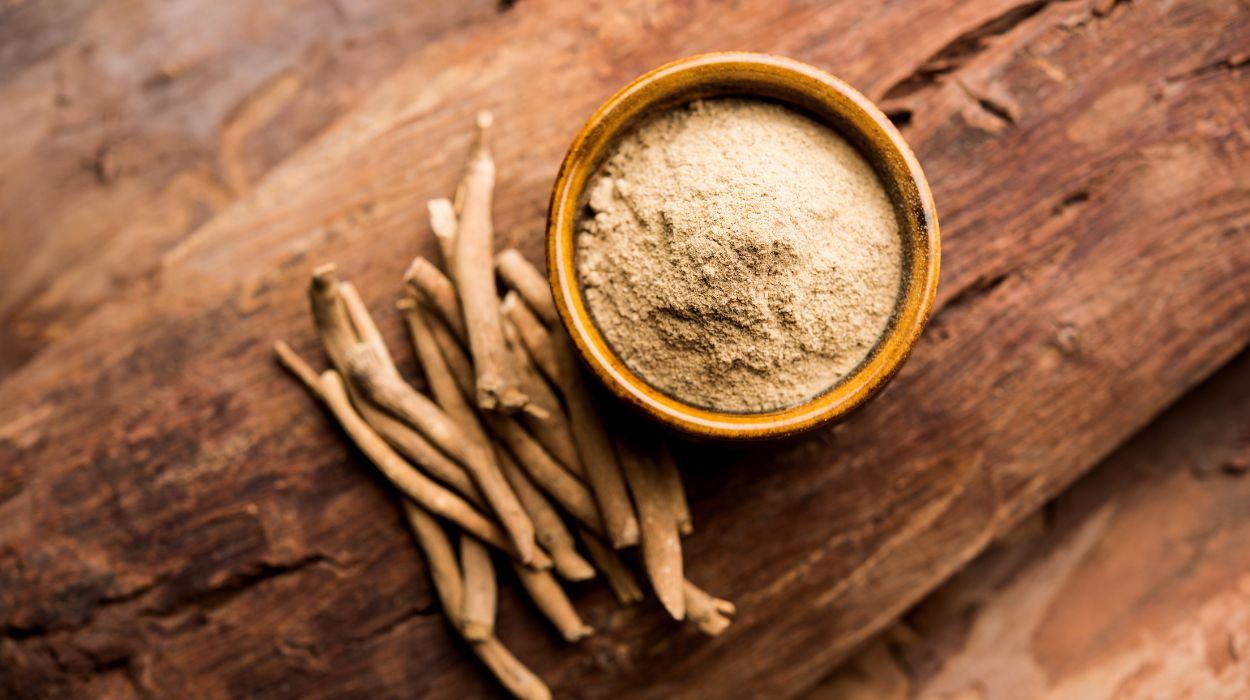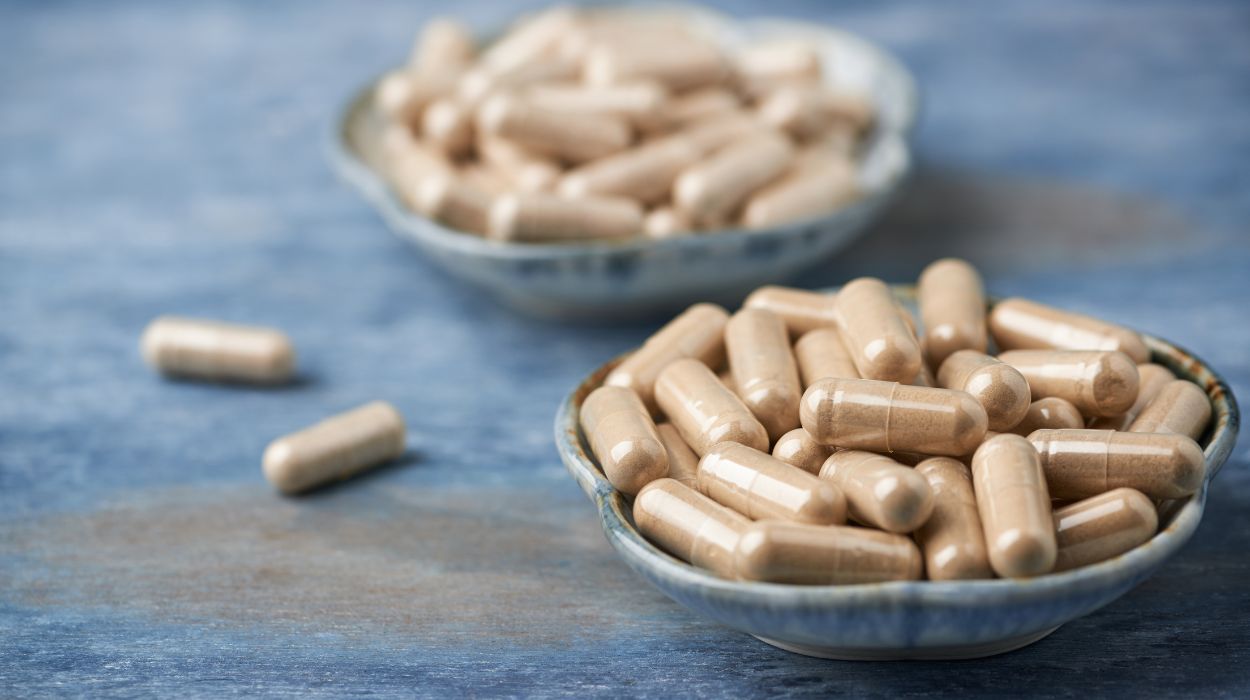Ashwagandha is an adaptogen herb that originates in India and other parts of Southeast Asia. It’s known for its anti-stress qualities and is often prescribed for patients who need to reduce anxiety, improve sleep, and lower inflammation in the body. Ashwagandha has been used for centuries in ancient, alternative medicine, but has become more “mainstream” in recent years due to its powerful effect on wellness. In addition to less stress, Ashwagandha has many other health benefits including improved memory, strength, and fertility.
7 Ashwagandha Benefits
- Reduces stress and anxiety
- Improves depression and mental health
- Reduces blood sugar
- Boosts male fertility
- Reduces inflammation
- Improves memory
- Improves sleep quality
Health Benefits Of Ashwagandha
Here are the top 7 health benefits of ashwagandha root extract, including physical and mental health:
Reduce Stress And Anxiety
Ashwagandha is an adaptogen[1] herb, meaning it “helps the body cope with stress”. It does this by mediating certain stress chemicals in the body, such as stress-causing proteins and cortisol (the body’s stress hormone). It also helps to reduce stress-related disorders in the body’s HPA axis or the hypothalamic-pituitary-adrenal axis. In various studies, participants who took Ashwagandha supplements for two months had significantly less anxiety and better sleep than those who took a placebo. Stress symptoms such as rapid heart rate and high blood pressure can also be reduced as a result of taking Ashwagandha.
Improve Depression And Mental Health
Just as Ashwagandha can help reduce stress and anxiety, it may also have positive effects on depression, specifically for those who may also suffer from other mental health conditions, such as schizophrenia. In one study,[2] Ashwagandha was given to more than 60 people with schizophrenia who also had anxiety and depression. Results showed that those who took Ashwagandha for three months had more of a reduction in depression and anxiety symptoms when compared with the placebo group. There’s also some evidence to suggest that Ashwagandha may improve cognition in people with bipolar[3] disorder.
Reduce Blood Sugar
For those with diabetes, managing blood sugar is essential. Ashwagandha may play an important role in this process because of its potential to keep blood sugar[4] levels at bay. It does this by increasing insulin production and sensitivity (the body needs enough insulin and sensitivity to insulin in order to manage blood sugar). Some studies suggest that Ashwagandha may also directly lower blood glucose levels when taken in powder form.
Boost Male Fertility
Ashwagandha has properties that can enhance fertility, particularly for men. DHEA-S is a sex hormone that is needed to produce testosterone, and studies have found that men who took Ashwagandha to help them conceive had a significant increase in DHEA-S levels, which led to an increase in testosterone as well. Furthermore, sperm counts improved for men who used Ashwagandha as a treatment for low sperm counts. More specifically, the concentration and motility of the sperm as well as semen volume improved. Ashwagandha had a similar effect in men who had normal sperm counts,[5] as well.
It’s worth noting that Ashwagandha may also improve female fertility as it works to balance hormones and boost sex drive (Ashwagandha is also an aphrodisiac).
Reduce Inflammation
Inflammation is at the root of many life-threatening and chronic diseases, such as heart disease, cancer, and diabetes, as well as arthritis, GI conditions, and skin conditions. Reducing inflammation is essential to avoiding potentially deadly health conditions and Ashwagandha has many anti-inflammatory properties that naturally reduce inflammation. It does this by downregulating inflammatory gene markers while upregulating the anti-inflammatory ones.
Improve Memory
It’s widely believed that memory[6] and cognition, in general, can be positively affected by taking Ashwagandha root extract, more specifically, attention and the speed at which a person can interpret new information. Compared to the placebo group, people who took Ashwagandha to improve cognition had greater success when tested in studies. The research suggests looking at participants’ reaction times and the ability to respond to commands while performing a task. Another study also showed that attention spans and memory improved when taking Ashwagandha.
Improve Sleep Quality
Not surprisingly, as Ashwagandha has a relaxing and calming effect on anxiety, it can also improve sleep quality, with the added bonus of more mental clarity after waking. One theory is that the same mechanisms that reduce anxiety also help the body to be more restful, lengthening sleep time and expanding sleep quality. Results may vary from person to person and may be more noticeable in people who suffer from insomnia. It’s important to take Ashwagandha consistently to see the best results.
What Is Ashwagandha?

Ashwagandha is one of the most widely used adaptogenic herbs (herbs used to relieve stress), especially among more traditional Ayurvedic medicine practitioners. Ashwagandha, also called “Indian Ginseng”, has a long history in India for its medicinal value, including Ayurvedic practitioners. In Sanskrit, Ashwagandha translates to “smell of horse”,[7] which is said to reference the smell of the herb as well as its ability to help improve strength, but it is also referred to as “Indian ginseng” and “Winter cherry”. Ashwagandha root extract originally comes from India and Southeast Asia. The Western world has been using it more and more as word about its healing properties has spread far and wide.
Who Will Need Ashwagandha?
Ashwagandha is generally well-tolerated and can have positive, relaxing effects on many individuals. It can confer many health benefits and may help in disease prevention and management, however, it’s a powerful herb and should not be taken blindly without the guidance of a skilled practitioner who can recommend a good brand and specific dosing for your unique health concerns. Those who are looking to conceive, improve their memory and cognition, or those who need to reduce inflammation and stress may benefit from adding Ashwagandha to their supplement regime.
Best Ashwagandha Supplements

Ashwagandha root comes in capsule, ashwagandha powder, or liquid/tincture form. Which form you choose will depend on why you’re taking it and your preferences. Your doctor may also have reasons for choosing one form over another. When it comes to choosing supplements, it’s important to choose quality brands that use organic ingredients and minimal processing or fillers. Some companies are transparent about how they manufacture their supplements and have higher standards for the quality of their products. Some examples of high-quality supplement brand names include:
- Integrative Therapeutics
- Gaia
- Now
- Thorn
- Life Extension
- Pure Encapsulations
- Nature’s Way
- Klaire Labs
- Biotics Research
- Seeking Health
- Tribe Organics
If taking Ashwagandha root extract, you may wish to find it from one of these brands, however, this is not an exhaustive list and there may be other brands that are equally good and effective.
Potential Risks & Dosage
Always consult with a doctor before starting any new supplement. Ashwagandha is a strong herb that may cause GI symptoms[8] such as diarrhea and vomiting for some people, especially if taking too much of it. Additionally, Ashwagandha may interfere with thyroid tests and should not be taken several weeks before having surgery. Ashwagandha may also interact with certain blood thinning medications, thyroid medications, medications for blood pressure and diabetes, anxiety medications, and other supplements that have a relaxing effect, such as valerian.
Dosing will vary depending on what it’s being used for, but will likely fall between 250-500 milligrams (mg) per day. It’s advised to take Ashwagandha for at least one month in order to experience the full benefits from it.
Conclusion
Ashwagandha is an adaptogen herb, native to India and Southeast Asia. There are several benefits of ashwagandha. Ashwagandha has medicinal properties that help with a variety of ailments including cognition, anxiety and depression, fertility, and chronic disease management. It’s important to note that the research on Ashwagandha extract is still limited and some studies are inconclusive. This does not, however, mean that the herb is ineffective, nor does it mean that the supplement should be taken lightly. When taken correctly and for your unique medical condition, it can have positive and profound influences on your emotional and physical well-being.
Frequently Asked Questions
Ashwagandha can help the body relax and has been shown in some studies to help improve sleep quality, however, it is not a sleeping pill and will likely not have an immediate effect. It must take at least four weeks to feel the effects.
This should be raised with your doctor. Ashwagandha extract can interfere with some anxiety medications and may not be suitable to take in addition to other stress-reducing medications.
Ashwagandha comes in ashwagandha powder form which many people like to mix into warm milk. This makes a relaxing drink to enjoy right before bed.
 Expert's opinion
Expert's opinion





